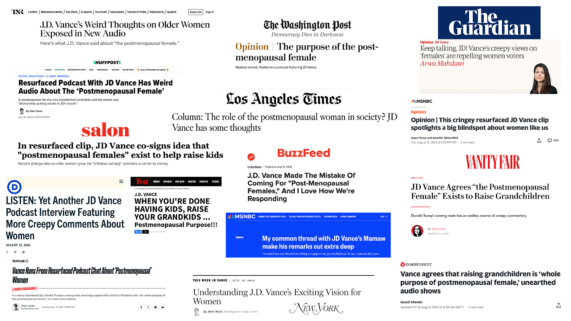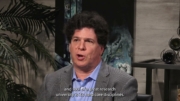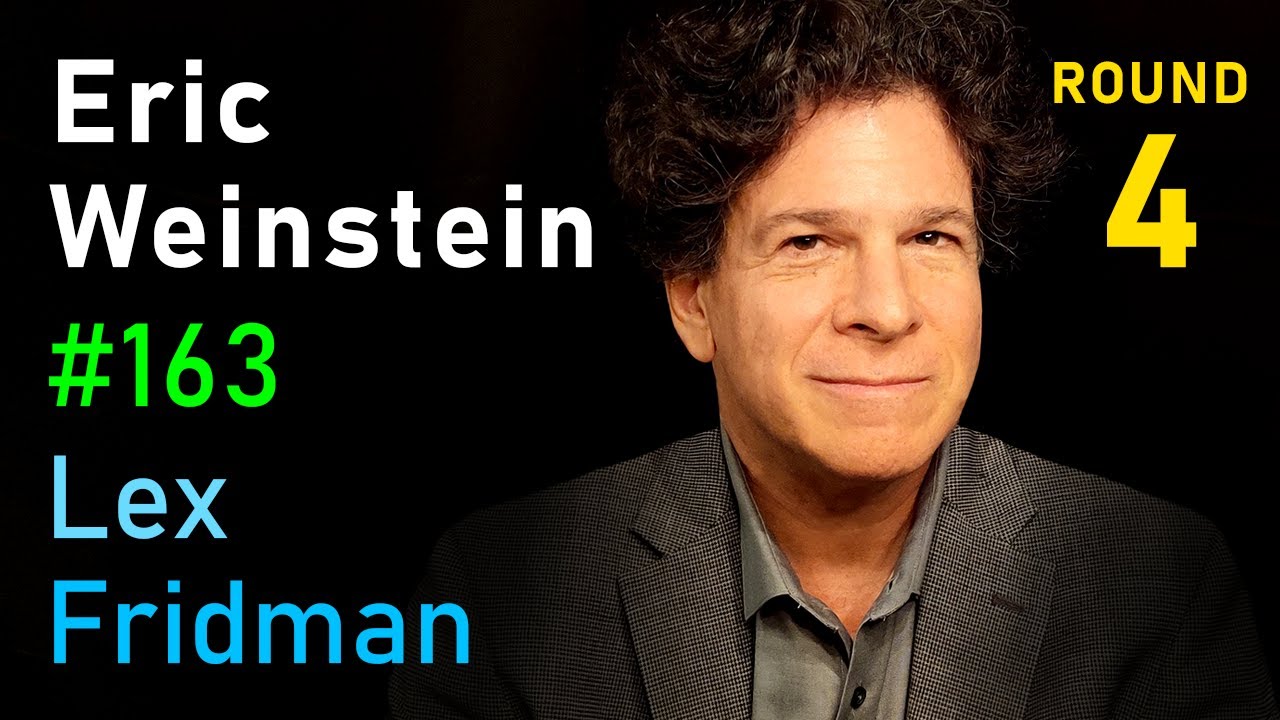
In the modern landscape of media and academia, the line between factual reporting and ideological sensationalism has become increasingly blurred. This phenomenon is particularly evident in the recent media coverage surrounding Eric Weinstein’s 2020 podcast discussion with JD Vance, which has been selectively quoted and sensationalized in ways that misrepresent both the conversation’s context and the scientific principles at stake. Here we examine how the media’s handling of Weinstein’s remarks about evolutionary biology and postmenopausal women exemplifies the dangers posed by sensationalism and misportrayal to both public discourse and academic integrity.
Contextualizing the Media Coverage
In the months leading up to the 2024 U.S. presidential election, a snippet from Weinstein’s podcast resurfaced in the media, leading to a flurry of sensational headlines. The coverage largely focused on a brief exchange in which Weinstein described the evolutionary role of postmenopausal women in helping raise grandchildren, a concept rooted in the well-established “Grandmother Hypothesis.” JD Vance’s quick affirmation during this exchange was taken out of context and used to frame both Weinstein and Vance in a negative light, suggesting an antiquated view of women’s roles, while leaving out the academic context of the discussion.
This media treatment starkly contrasts with the nuanced discussion that originally took place, which was concerned with evolutionary biology and the social implications of these biological processes. In our article, “Who Are You and Get Out of My Lab: Eric Weinstein Predicts Activists Coming for Academic Biology,” we highlighted Eric’s foresight regarding this type of ideological incursion into academia. Weinstein’s warnings about the infiltration of activist agendas into fields like biology are eerily prescient, particularly in light of how his scientific remarks have been distorted to fit a politically charged narrative.
The Misrepresentation of Scientific Discourse
The selective quoting and sensationalist framing employed by various media outlets have not only misrepresented the substance of Weinstein’s argument but also threaten the integrity of academic discourse itself. In public discussions going back at least as far as 2018, Weinstein articulated concerns about the encroachment of activism into scientific fields, arguing that scholarship should be guided by rigorous standards of evidence rather than ideological commitments. This point is lost when the media reduces a scientific theory to a politically controversial soundbite.
The “Grandmother Hypothesis,” the scientific concept at the center of this controversy, is a theory in evolutionary biology suggesting that the extended post-reproductive lifespan of women plays a crucial role in the survival and success of their descendants. Grandmothers, by helping to raise grandchildren, improve the fitness of their kin, thereby contributing to the evolutionary process. This hypothesis has been supported by empirical studies across various cultures and species, underscoring the significant role grandmothers have played in human evolution. For example, research on Hadza hunter-gatherers in Tanzania has shown that children’s survival and growth depend significantly on the foraging efforts of their grandmothers, particularly after they are weaned (Oxford Academic) (Springer).
The importance of grandmothers extends beyond human societies. The presence of post-reproductive females in other species, such as killer whales, further illustrates the adaptive advantages of the “grandmother effect,” where grandmothers help increase the survival of their grandchildren by guiding them to resources during times of scarcity (Smithsonian Magazine). Despite some skepticism, this theory remains a cornerstone of discussions on human longevity and reproductive strategy, challenging the notion that postmenopausal life lacks evolutionary purpose.
The Threat to Academic Freedom
The media’s handling of Weinstein’s discussion also illustrates a broader and more troubling trend: the erosion of academic freedom under the pressure of ideological agendas. Weinstein’s earlier discussions have highlighted the dangers of allowing activist-driven scholarship to dictate the boundaries of inquiry, particularly in fields like mathematics, physics and biology that are hard core disciplines. The recent media coverage exemplifies the very threat Weinstein warned about, as scientific discourse is increasingly shaped by political and national security narratives rather than objective inquiry.
This misrepresentation poses a direct threat to the autonomy of academic research. When media coverage prioritizes sensationalism and optics over substance, it creates a chilling effect that discourages scholars from engaging in open and honest discussions, particularly on topics that intersect with sensitive cultural or political issues. The fear of being misrepresented or taken out of context can lead to self-censorship, undermining the very foundation of academic freedom.
The Broader Context: Narrative Control and FUD Campaigns
The media’s handling of Weinstein’s discussion is not an isolated incident but part of a broader pattern of narrative control, shadow-banning and reputational destruction against heterodox academics that Weinstein has been critiquing for years. In a series of tweets, Weinstein has highlighted how Fear, Uncertainty, and Doubt (FUD) campaigns are systematically deployed to discredit those who challenge mainstream narratives. Whether through coordinated smear tactics, the amplification of negative labels, or the throttling of online visibility, these efforts aim to undermine the credibility of dissenting voices while ensuring that institutional narratives remain unchallenged.
For instance, Weinstein has pointed out how Google searches often associate respected academics with pejorative terms, a tactic designed to frame public perception against them. He has also drawn attention to the systematic suppression of his reach on social media, which he views as part of a broader strategy to control the flow of information and marginalize those who refuse to conform to approved narratives. These FUD tactics are not just about reputational damage—they are about shaping the very contours of public discourse by making certain ideas and voices seem illegitimate or fringe.
After warning Lex in 2020 about the inevitability of future attacks to his reputation, Weinstein pointed out in a thread from 2023 that even well-credentialed public figures with STEM PhDs like Lex Fridman, who possess “self-minted credibility,” are not immune to these tactics. He described how coordinated ridicule and mockery are often used to manipulate public perception, turning genuine discourse into something trivial or suspect. This pattern of discrediting independent thinkers aligns closely with the media’s recent portrayal of Weinstein’s evolutionary biology discussion, where a complex scientific theory was reduced to a politically charged narrative, robbing it of its context and meaning.
Defending Academic Rigor and Integrity
In light of these developments, it is imperative that the academic community and responsible media outlets take proactive steps to defend the integrity of scientific discourse, particularly by including expert heterodox voices in academia and institutions. Academics must remain vigilant against attempts to co-opt their work for ideological purposes, while journalists must recommit to the ethical standards that ensure accurate and fair reporting. This involves not only correcting misrepresentations when they occur but also fostering a media environment that values depth and context over sensationalism, oversimplification and misrepresentation.
The recent onslaught of media coverage of Eric Weinstein’s podcast discussion is not an isolated incident but part of a broader trend of sensationalism image cheapening via perseveration of prebunked malinformation that threatens to erode the foundations of both journalism and academia. As Weinstein has long argued, the infiltration of activist agendas into scientific research poses an existential threat to disciplines that rely on rigorous, evidence-based inquiry. The media’s misrepresentation of his remarks underscores the urgency of this issue and calls for a renewed commitment to defending the principles that underpin academic and journalistic integrity.








